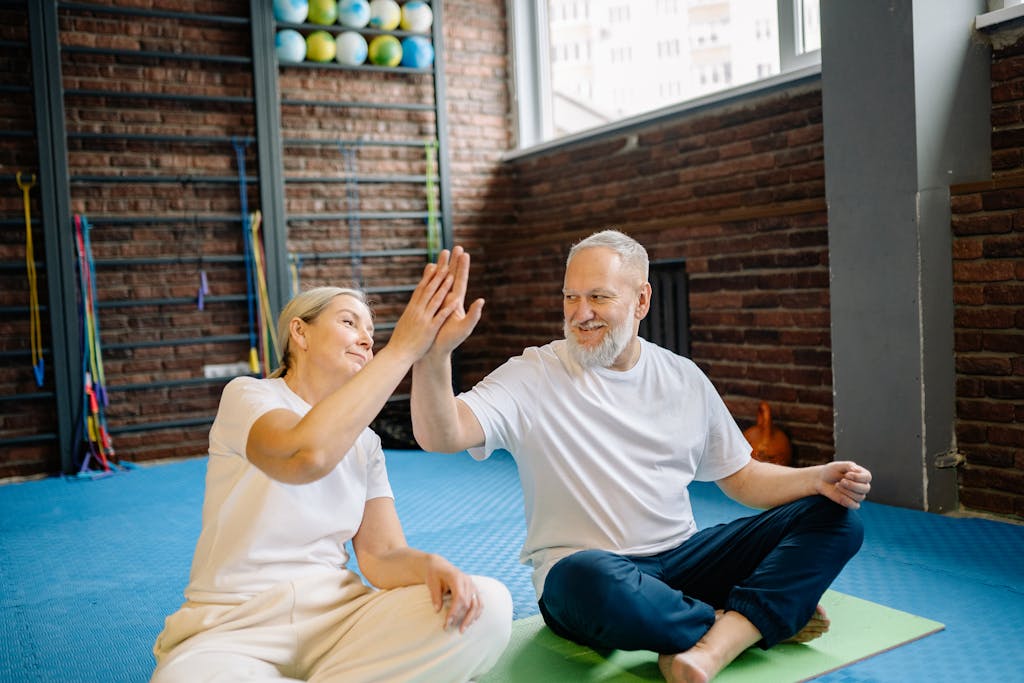Living a long life isn’t enough; the quality of those years matters more. This is the crucial difference between lifespan vs healthspan — one measures the total number of years lived, while the other looks at how many of those years are spent in good health.
Biohacking, through lifestyle modifications and modern tools, aims to increase not only lifespan but, more importantly, healthspan, promoting healthy aging and ensuring we live our extra years in good health and vitality.

What Is the Main Difference Between Lifespan vs Healthspan?
Understanding the difference between lifespan and healthspan is critical in your journey toward optimal health. Lifespan refers to the total number of years a person lives, while healthspan measures the years spent in generally good health, free from chronic diseases and physical or mental decline. Ideally, we want our healthspan to match our lifespan, which is where biohacking comes in.
Biohacking helps bridge the gap between the two by optimizing lifestyle factors, such as dietary supplements, exercise, and mental health, so that you can live a longer and healthier life.
What Is Lifespan?
Lifespan is simply the number of years an individual can live under optimal conditions. Advancements in healthcare, improved living conditions, and health optimization strategies have steadily extend lifespan over the years.
However, living longer doesn’t necessarily mean living better. For many people, their later years are marked by age-related diseases and physical or cognitive decline. This is why the focus is shifting from just increasing lifespan to improving the quality of life during those years.
Historically, efforts to increase life expectancy have concentrated on disease prevention and the treatment of chronic illnesses. While these methods have contributed to longer life expectancy, they haven’t always addressed the underlying causes of biological aging, such as cellular senescence and declining physiological functions.
- Global life expectancy has risen, but there’s often a gap of 10-20 years between lifespan and healthspan.
- This gap is filled with years where individuals suffer from age-related conditions such as chronic diseases, cognitive decline, and cardiovascular disease.

What Is Healthspan?
In contrast to lifespan, healthspan refers to the years in which an individual enjoys good health, free from significant illness or age-related decline. The goal is not only to live longer but to live healthier for as long as possible. A person with a long lifespan but a short healthspan might spend the last decades of their life battling chronic diseases, immobility, or cognitive impairment.
There are several key components to increasing healthspan, and biohacking focuses on optimizing these factors:
- Lifestyle choices: These include everything from dietary supplements to exercise routines and mindfulness practices. For example, intermittent fasting can improve mitochondrial function and help delay the onset of age-related diseases.
- Healthy cells: The maintenance of healthy cells is crucial for extending healthspan. Damage caused by oxidative stress accelerates the aging process and decreases cell’s ability to regenerate and repair tissues.
- Reduce oxidative stress: Biohacking strategies like incorporating antioxidants into your diet or using supplements like resveratrol can help reduce the impact of oxidative stress, thereby extending both lifespan and healthspan.
- Environmental factors: Limiting exposure to environmental toxins and pollutants, such as air pollution and chemicals in food or water, can dramatically affect healthspan by preventing cellular damage and promoting overall health.

Statistical Data on Healthspan and Lifespan
While the average life expectancy has increased, the focus now shifts toward narrowing the gap between lifespan and healthspan. On average, people spend around 10-20 years living with significant health decline. Here are some key statistics:
- The average lifespan in the U.S. is about 79 years, but the average healthspan is only 63 years.
- People in Japan have one of the longest healthspans, with an average of 75 years out of an 84-year lifespan.
- Age-related diseases like cancer cells, cardiovascular disease, and Alzheimer’s disease are the primary causes of this gap between lifespan and healthspan.

The Importance of Healthspan in Reducing Age-Related Diseases
Quality of life considerations: healthspan affects an individual’s ability to function and enjoy life
Maintaining good health allows us to enjoy the activities we love and live life to the fullest. Healthspan is essential for quality of life and overall well-being.
Economic Implications of Healthspan and Lifespan
The economic implications of healthspan are significant, particularly when considering the rising costs of healthcare and lost productivity due to age-related diseases. As people live longer but spend more years in poor health, healthcare systems are increasingly burdened by the costs of managing chronic conditions like cardiovascular disease, diabetes, and Alzheimer’s disease. These illnesses require long-term treatment, medication, and often costly medical interventions, which strain both public and private healthcare resources.
Extending healthspan through biohacking and other preventative strategies can mitigate these economic burdens by keeping individuals healthier and more productive for a longer portion of their lives. By focusing on disease preventionand promoting healthy aging, societies can reduce healthcare expenditures and preserve workforce productivity, benefiting both individuals and the economy at large.
How to Extend Healthspan Using Biohacking
Nutrition and Diet
Diet plays a massive role in extending both lifespan and healthspan. Incorporating methods like caloric restriction or intermittent fasting can improve energy metabolism and delay the onset of age-related decline. These methods activate certain longevity genes and improve mitochondrial function, which helps in maintaining healthy cells.
Implementing intermittent fasting to decrease elevated LDL cholesterol
Intermittent fasting has been shown to decrease body weight, total fat mass, LDL cholesterol, and other lipid markers.Time-restricted feeding involves eating all meals and snacks within an eight to ten-hour window and fasting for the remaining fourteen to sixteen hours each day.
Research shows a strong correlation between blood glucose and age—a lower glucose level is associated with younger age and vice versa.Consistent supplementation of 1000 mg of resveratrol can reduce glucose levels by up to 35mg/dL, improve insulin sensitivity, and reduce inflammatory markers in the body.

Exercise and Physical Activity
Engaging in regular physical activity is one of the most effective ways to increase healthspan. Exercise improves cardiovascular health, maintains muscle mass, and helps combat chronic diseases. It can also help reduce the likelihood of developing chronic diseases, such as kidney disease and neurodegenerative diseases.
Regular exercise enhances mitochondrial function and increases cellular senescence, which is crucial for maintaining overall health as you age.
Activities like strength training and aerobic exercise enhance cognitive function, improve skin elasticity, and help the body resist the effects of aging.
- Physical activity stimulates cellular senescence, increasing the body’s ability to repair tissues and regenerate cells.
- Exercise is also associated with the reduction of oxidative stress, which contributes to overall well-being and a longer healthspan.

Mental Health and Mindfulness
Optimizing mental health is essential for increasing healthspan. Chronic stress is a significant factor in premature aging and can accelerate the decline of cognitive function. Practices such as meditation, mindfulness, and deep breathing can help reduce stress and improve brain health.
- Regular stress management techniques enhance your mental well-being and promote a longer, healthier life.
- Mindfulness practices also boost cognitive function, reducing the risk of age-related cognitive decline.

Sleep and Recovery
Sleep is a vital component of healthspan. Lack of sleep accelerates aging, weakens the immune system, and contributes to the onset of chronic diseases like cardiovascular disease and cognitive decline. Biohacking strategies such as using blue light blockers, optimizing sleep environments, or tracking sleep data can help you maintain better sleep hygiene.
- Quality sleep supports the body’s natural physiological functions, including repair of tissues and the removal of toxins from the brain.
- Adequate sleep is also crucial for maintaining skin elasticity and overall well-being.
Gadgets and Tools
Biohacking tools, such as wearables, fitness trackers, and even more advanced gadgets like infrared light therapydevices, can help track and improve key health metrics like heart rate variability, mitochondrial function, and cellular senescence.
- Monitoring your body’s performance and adjusting your routine based on the data can significantly extend both lifespan and healthspan.
- These devices help with health optimization, giving real-time feedback on factors like stress levels, sleep quality, and physical activity.

Supplements to Improve Health Span
Supplements are a crucial part of biohacking to boost your healthspan. Biohacking is often associated with dietary supplements that can delay aging and improve overall health. Specific supplements, such as NAD+ boosters and resveratrol, can extend healthspan by improving mitochondrial function, supporting cell division, and reducing chronic inflammation.
- Resveratrol: This powerful antioxidant can help reduce oxidative stress and improve cardiovascular health. Resveratrol supplements also reduce blood glucose, a key biomarker connected to aging
- NAD+: Essential for DNA repair and cellular senescence, this supplement is critical for both lifespan and healthspan.
- Vitamin D and omega-3 fatty acids: These improve muscle mass, cognitive function, and support a longer, healthier life.Supplements to Improve Healthspan
- Curcumin: Incorporating curcumin, a key component of turmeric, to reduce CRP inflammation levels. Research points to a connection between high inflammation levels, measured by the biomarker hsCRP, and age-related conditions such as metabolic syndrome and diabetes.Curcumin is a unique polyphenol found in turmeric that has powerful properties that can reduce inflammation.Supplements to Improve Healthspan

Dr. Sinclair’s Research on Healthspan and lifespan
Dr. David Sinclair, a renowned researcher in the field of aging and longevity, has significantly advanced our understanding of how to extend both lifespan and healthspan. As a professor of genetics at Harvard Medical School, Dr. Sinclair’s groundbreaking research focuses on biological aging and the molecular mechanisms that contribute to it. He posits that aging is not an inevitable process but rather one that can be slowed—and potentially reversed—through strategic interventions aimed at cellular health.
Dr. David Sinclair has made significant strides in understanding how genetic factors influence both lifespan and healthspan. His work focuses on slowing the aging process by targeting cellular senescence and promoting gene expression that supports a long and healthy life.
Key takeaways from Dr. Sinclair’s research
- Deregulated nutrient sensing is a key factor in aging, and addressing this through caloric restriction or intermittent fasting can slow aging.
- Sirtuins and NAD+ play a pivotal role in extending lifespan and improving healthspan by repairing DNA and reducing cellular damage.
- Emerging research indicates that targeting the aging process can help prevent age-related diseases and support a fulfilling life.
His work has inspired a new wave of longevity research focused on delaying or reversing the symptoms of aging, rather than merely treating the diseases associated with old age. This shift toward healthspan extension, rather than just increasing lifespan, aims to ensure that people not only live longer but live healthier, more fulfilling lives free from chronic diseases and age-related disorders.

Conclusion
Improving both your lifespan and healthspan is achievable through the biohacking strategies mentioned in this guide. From optimizing your diet and exercise routine to incorporating supplements and using the latest gadgets, you can live not only longer but better. Biohacking is the key to living a long and healthy life, free from the burdens of chronic disease and aging-related disorders.
By focusing on mental health, physical activity, and overall well-being, you can significantly reduce your risk of developing chronic diseases and improve the quality of your extended years.







